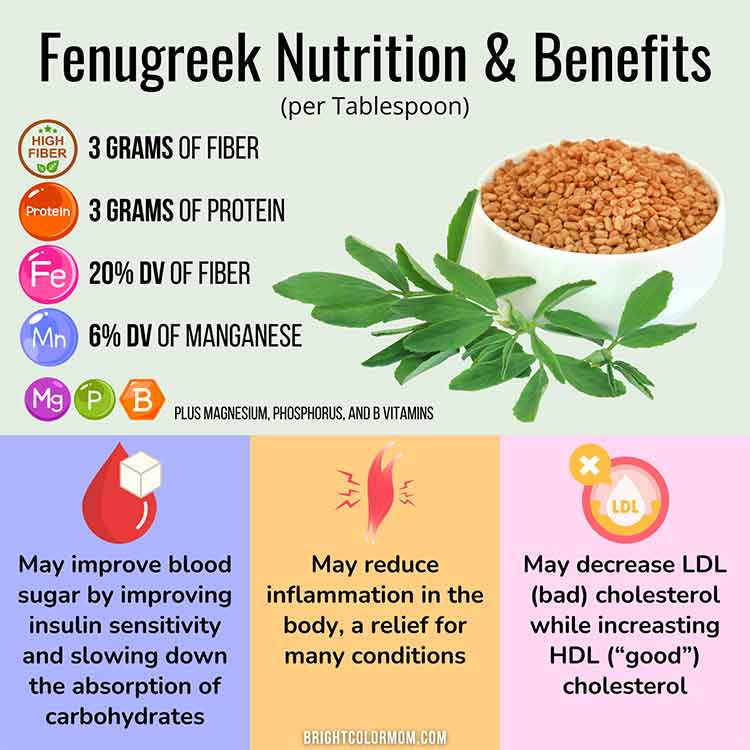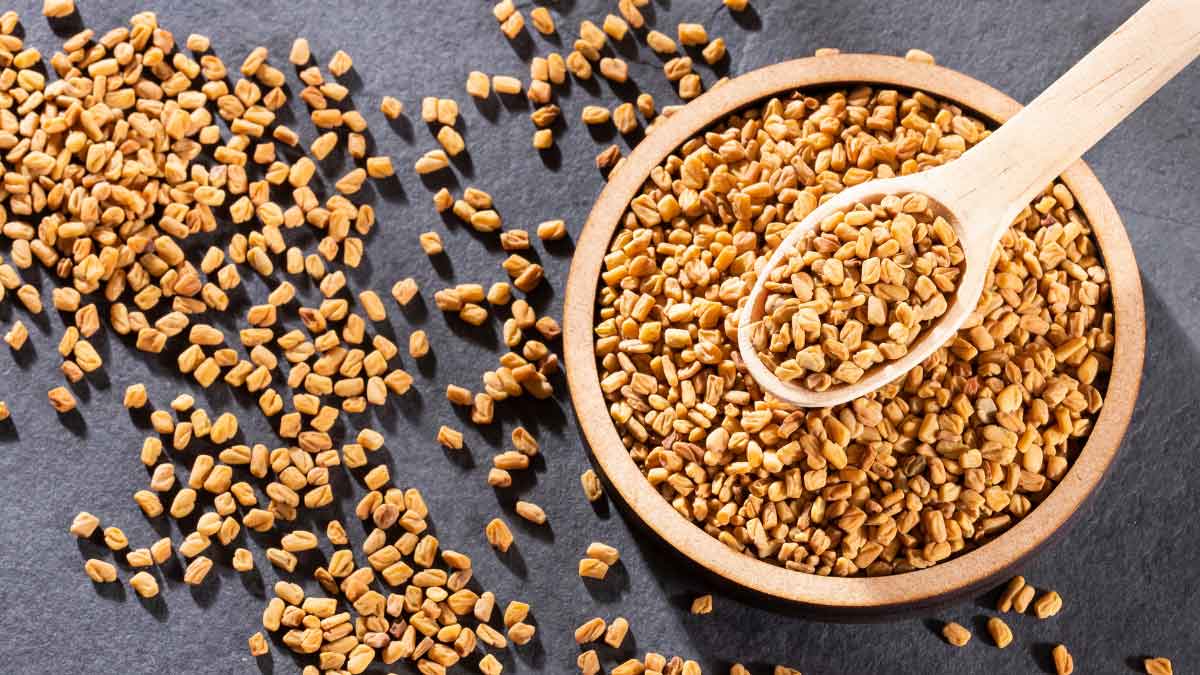Let’s talk fenugreek benefits! This isn’t your average grocery store spice (although it should be!). Fenugreek is a little seed with a big history, used in everything from ancient Egyptian beauty routines to modern Indian curries. But what’s really caught your eye (and brought you here) is the buzz around fenugreek and its potential benefits.
If someone recommended you take fenugreek to boost your breastmilk supply – whether it was a family member or a lactation specialist – I’ll explain why I don’t recommend using it. I’ve got personal experience and plenty of scientific and anecdotal evidence to explain why this common recommendation should be shelved.
Nutrition in Fenugreek
Fenugreek isn’t exactly winning any beauty contests (it looks a bit like a weird clover), but don’t let its looks fool you. This little seed is bursting with good stuff! We’re talking vitamins, minerals, and fiber – all the things your body craves to keep you feeling on top of your game. Here’s a quick rundown of what a tablespoon of fenugreek seeds packs.
- Fiber: 3 grams
- Protein: 3 grams
- Iron: 20% of your Daily Value
- Manganese: 6% of your Daily Value
- Plus, smaller amounts of magnesium, phosphorus, and B vitamins

See? Tiny seed, big impact. Let’s talk about all the benefits fenugreek has to offer!
Benefits of Fenugreek
Now that we know fenugreek is a nutritional powerhouse, let’s dive into its potential health benefits. Remember, some of these have stronger scientific backing than others, but they’re all worth exploring!
Easing Menstrual Cramps
One study shows that women who consumed 900mg of fenugreek three times daily during their cycles experienced a significant reduction in pain. This was particularly true for the second cycle of this experiment. If you suffer from severe cramping during your period, it could be worth a try!
Blood Sugar Balancing
Fenugreek might be your new best friend if you’re looking for natural ways to manage your blood sugar. Research suggests that fenugreek seeds may help improve insulin sensitivity and slow down the absorption of carbohydrates in your gut. This can be especially helpful for those with prediabetes or type 2 diabetes.
Cholesterol: Lowering the Bad, Keeping the Good
Early research indicates that fenugreek might have cholesterol-lowering properties. Studies like this one suggest that fenugreek may help decrease LDL (“bad”) cholesterol levels while potentially increasing HDL (“good”) cholesterol. This could be a win-win for your heart health, but more research is needed to confirm these effects.
Reduced Inflammation
Fenugreek’s properties might help reduce inflammation in the body, which could be beneficial for various conditions. A big one is eczema, which is an inflammatory response in your skin to allergens and irritants. Improving this condition can help your skin have a healthier glow.
Other Potential Benefits
Fenugreek’s bag of tricks might not stop there! Researchers are exploring other potential benefits of this wonder seed, including the ones below.
- Antibacterial Aid: Fenugreek is sometimes touted as an acne cure because of its antibacterial properties. Keep in mind this university study, though, that shows prescription antibiotic is more effective for reducing acne.
- Digestive Support: Early studies suggest fenugreek may aid digestion and soothe occasional digestive discomfort.
- Weight Management: Some research suggests fenugreek may promote feelings of fullness and help with weight management, but more studies are needed.
- Reduced Hair Loss: While someone beauty blogs claim fenugreek is a magical cure for hair growth, the reality is this is untrue. Limited studies have been done and they don’t show improved hair growth – but they do show decreased hair loss.
- Male Testosterone: In men with waning testosterone, fenugreek can help boost their levels (and libido). Might be something to keep in mind for your partner!
It’s important to remember that these are just emerging areas of research, and more studies are necessary to confirm these potential benefits.
Fenugreek Side Effects & Safety Considerations
Fenugreek is a generally safe addition to your wellness routine for most healthy adults. However, like any new ingredient, it’s important to be aware of a few things.
Side Effects
Fenugreek can cause some minor digestive issues like bloating, gas, or diarrhea, especially when you’re first starting with it. These usually subside as your body adjusts. It can also give your urine or sweat a slight maple-syrupy scent – harmless but interesting!
Allergic Reactions
As with any new food, there’s a chance you could be allergic to fenugreek. Watch for symptoms like hives, swelling, or trouble breathing, and discontinue use if you experience any of these.
Not for Everyone
Fenugreek isn’t recommended for pregnant women due to its potential effects on uterine contractions and the safety of the baby. It’s also best to avoid fenugreek if you are on blood sugar-lowering medications, as it can further decrease your blood sugar levels.
Supplement Safety
When it comes to supplements, always consult your doctor before adding them to your routine. They can interact with certain medications and may not be suitable for everyone.
More is Not Always Better
Excessive consumption of fenugreek seeds or supplements can lead to stomach upset and other unpleasant side effects. Stick to the recommended dosage and listen to your body.
When in doubt, talk to your doctor before incorporating fenugreek into your routine. They can help you determine if it’s a safe and suitable addition to your wellness journey.
Breastfeeding? Skip Fenugreek
In the past, fenugreek earned fame for helping lactating mothers increase their milk supply. This traditional use actually has some scientific backing. Studies like this one suggest that fenugreek may help stimulate milk production. But an important caveat is that it only helped when taken with honey. When taken by itself, it did nothing for milk supply.
As a first-time mom, I struggled tremendously with my breast milk supply. Naturally, I scoured the internet for information on how to increase it and came across fenugreek supplements. In my desperation, I ended up taking four gigantic capsules three times a day.
The results were astounding! As in… they didn’t do a thing for my milk supply. In fact, I was taking fenugreek, drinking mother’s milk tea, eating lactation cookies, drinking gallons of water… and I never produced more than one or two 4-ounce bottles a day for my daughter. It wasn’t until much later that I learned I have mammary hypoplasia, and nothing I could’ve done would’ve increased my supply.
A little digging around the internet, and you’ll find many other anecdotes of fenugreek either not helping or decreasing supply further. Does it work for some women? Multiple studies have shown that it does – but they often note that it’s still not as effective as other options, including prescribed medications.
If the choice is between potentially increasing my supply or potentially losing it completely, I would skip the fenugreek and feed my baby whatever breast milk I could produce, supplementing it with formula. A little breast milk is better than none!
Lactation Support for Breastfeeding Mothers
If you want to increase your breastmilk supply, fenugreek is a common recommendation from friends, family, and even lactation consultants (LCs). However, it’s important to remember that every mom and baby is different. What works for one person might not work for another.
I don’t believe fenugreek is the best fit for breastfeeding moms, but that doesn’t mean there aren’t natural ways to support your milk production! These resources can also be helpful for breastfeeding moms looking for ways to increase their milk supply.
- WIC Breastfeeding Support: Low Milk Supply
- La Leche League International: Increasing Milk Supply
You’ve got this! And with the right support and guidance, you can achieve your breastfeeding goals.
This post may contain affiliate links. If you make a purchase after clicking one, I may receive a small commission at no cost to you.
Ways to Take Fenugreek
So, you’re sold on fenugreek’s potential? Awesome! Now, how do you actually use this wonder seed? Fenugreek comes in a few different forms, each with its own pros and cons.
Seeds
The OG form! They pack the most nutritional punch but can be a bit bitter. You can toast them for a milder flavor, then grind them in spices or add them whole to curries and stews. Start with a 1/2 teaspoon and adjust based on your taste.
Supplements
Available in capsules, these are convenient and easy to dose. Typical recommendations range from 500-1000mg daily, but always follow the instructions on the label and consult your doctor before starting any supplements.
Powder
Ground fenugreek seeds offer a concentrated flavor kick. Use it sparingly in spice blends or sprinkle it over yogurt for a surprising (but delicious!) twist.
Tea
Fenugreek tea is a gentle way to reap the benefits. While not as potent as other forms, it’s easy to sip on throughout the day.
Fenugreek-Spiced Roasted Vegetables
Ready to get creative? Here’s a simple recipe to get you started.
- Toss your favorite veggies (think broccoli, Brussels sprouts, carrots) with olive oil, salt, pepper, a pinch of ground fenugreek, and a sprinkle of cumin.
- Roast at 400°F for 20-25 minutes, or until tender-crisp.
- Enjoy as a satisfying side dish or healthy snack!
A Spice with Potential
There you have it! Fenugreek is a tiny seed with a surprising range of potential health benefits, from blood sugar control to cholesterol reduction. While more research is needed on some fronts, it’s definitely an interesting addition to your wellness toolbox.
The best approach is to chat with your doctor before incorporating fenugreek supplements or significantly increasing your intake through food. They can help you determine if it’s a safe and effective option for your individual needs. But one thing’s for sure – fenugreek is a spice worth getting to know. It might just become your new secret weapon for a healthier, happier you!








